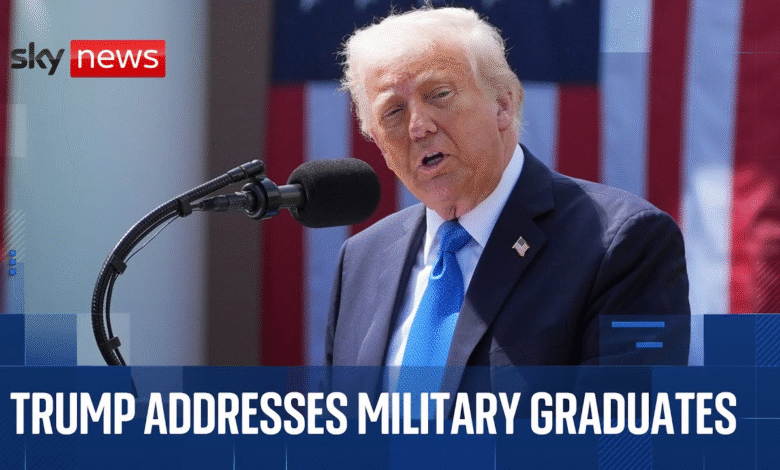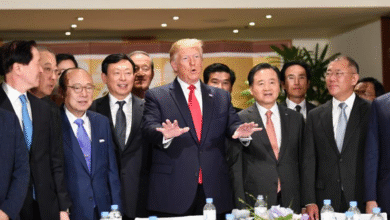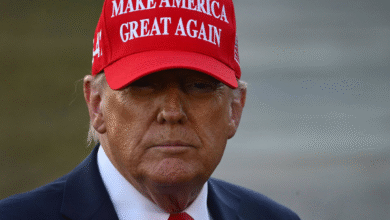Trump West Point Speech: A New Era for the Military

In a powerful address to the West Point graduates, President Donald Trump delivered a stirring speech that outlined his administration’s significant military changes. He emphasized the importance of an “America First military” approach, stressing that the era of a revitalized armed forces has begun. By dismantling diversity, equity, and inclusion programs, Trump asserted that he prioritized military strength and focus on readiness. “You are the first West Point graduates of the golden age of America,” he proclaimed, underscoring the significance of this moment in history. As the graduates prepared to lead the most formidable army in the world, Trump’s remarks resonated with those advocating for a return to traditional military values and a robust national defense.
During the recent graduation ceremony at the U.S. Military Academy, the focus was notably on the remarks made by President Trump, who heralded a transformative period for the nation’s armed forces. In what he termed the ‘golden age’ of military prowess, Trump reflected on the sweeping reforms he implemented, including a departure from progressive policies regarding diversity in military training. With a promise of renewed strength, his speech encapsulated an ethos of leadership that champions both excellence and readiness for on-the-ground challenges. By prioritizing a strong military identity through an America First lens, he rallied the new officers to rise to unprecedented heights in their service. This backdrop of change speaks volumes about the evolving landscape of military engagement and the values endorsed by this administration.
Trump’s Vision for Military Changes
President Trump’s address at the U.S. Military Academy at West Point was a proclamation of his administration’s sweeping changes to military structure and philosophy. He emphasized an uncompromising commitment to an ‘America First’ military strategy, aiming to restore strength and honor in a service that has faced complex challenges in recent years. This approach is characterized by a clear rejection of diversity, equity, and inclusion programs, which he argued had diluted the military’s focus on its core mission. Instead, Trump envisions a military that prioritizes effectiveness and readiness over political correctness, ensuring that troops are trained and equipped to face global threats head-on.
The focus on military restructuring is not only a nod to veterans and active service members but also a tactical strategy aligning with Trump’s broader campaign narrative. By claiming the U.S. military is now the strongest it has ever been, he seeks to appeal to a patriotic base that values traditional military virtues. This rhetoric resonates particularly well with those who believe that previous administrations had weakened military capabilities in favor of social policies. As such, Trump’s policies promise a return to what he calls the ‘golden age of America,’ rallying graduates to carry forth this legacy.
The Importance of Military Strength
A central theme of Trump’s West Point graduation speech was the reinforced military strength that he credits to his administration. He narrated a vision where U.S. forces dominate any would-be adversary, stressing that every soldier graduates with the responsibility of maintaining that dominance. This call to duty is framed within a narrative of revitalization, shifting away from what he perceives as ineffective past strategies that focused on nation-building instead of national defense. By reinforcing military strength, he envisions a future where America can navigate international conflicts with confidence.
Additionally, Trump’s assertion that the U.S. military is respected more than ever serves to bolster the morale of new officers and affirm their sense of purpose. The message delivered at West Point was clear: the graduates are at the forefront of a renewed doctrine where military excellence is paramount. Coupled with a resolve to reject divisive policies like DEI initiatives, Trump cultivates an image of a streamlined military, fully equipped to face modern challenges while fostering unity among its ranks.
Critique of Diversity, Equity, and Inclusion Initiatives
In a bold move, Trump used his platform during the West Point speech to criticize departmental diversity, equity, and inclusion programs that have pervaded military training in prior administrations. He argues that these initiatives serve no productive purpose within the structure of the armed forces, potentially distracting from the mission of preparedness and combat readiness. By promoting a narrative that abolishes such programs, he believes that the military can re-focus on its core objective: to defend the nation and ensure the security of its citizens, without the burden of political correctness.
The decision to eliminate DEI initiatives reflects a broader trend in Trump’s governance that prioritizes military and national security over socio-political agendas. This resonates strongly with a section of the populace who feel that the core values of the military should remain untainted by societal issues. Trump’s claims during the speech suggest that by stripping away DEI training, the military can ensure its personnel are psychologically aligned with their primary mission – ensuring America’s safety without the encumbrance of divisive political agendas.
The Role of West Point Graduates in Military Leadership
Trump’s address made it abundantly clear that he envisions West Point graduates as pivotal leaders within the military hierarchy. By framing them as the ‘first graduates of the golden age of America’, he instills a sense of historical importance and obligation. The call to lead with valor and integrity extends past the confines of the academy and into the global theater, where these officers are expected to embody the strength and spirit of a rejuvenated military force.
The infusion of traditional values into the fabric of military leadership underscores Trump’s broader strategy, pushing for a generation of leaders who are not only tactically proficient but also aligned with his America First ideology. This means a commitment to military readiness and respect for longstanding military traditions, which Trump argues are crucial for the future success and perception of the U.S. armed forces on the world stage. Thus, the graduates leave West Point not just with a commission, but with the weight of the nation’s expectations to restore and protect American ideals.
Implications of Trump’s Military Policies
The implications of Trump’s military policies articulated during his West Point speech extend far beyond the immediate context of the graduation ceremony. The abandonment of DEI initiatives poses significant questions about inclusivity within the military and the broader ramifications for recruitment and retention. Critics may argue that this policy shift could divide troops along cultural lines, potentially undermining the cohesion and unity essential for military effectiveness.
Moreover, by promoting an ‘America First’ strategy, Trump signals a departure from globalism to a more nationalistic approach, which could influence America’s foreign policy decisions and alliances. This strategic pivot may affect the U.S. response in global conflicts, as the emphasis on military strength could diminish diplomatic approaches traditionally employed by previous administrations. Overall, the long-term effects of this speech and subsequent military changes will be felt across various sectors, challenging the ideals of unity and diversity within the ranks.
Strengthening National Pride through Military Achievements
In his remarks, Trump highlighted a renewed sense of national pride woven into the fabric of military achievements. By referring to the U.S. military as the ‘greatest and most powerful army’, he reinforces the sentiment that America must embrace its strengths and accomplishments on the global stage. This focus on national pride serves to not only motivate the newly commissioned officers but also inspires confidence among citizens who are invested in the military’s reputation.
Trump’s narrative is purposefully crafted to resonate with the sentiments of those who revere the military as a key pillar of American identity. In an era fraught with challenges to national prestige, his approach emphasizes a belief that a powerful military and a strong sense of pride can deter adversaries and galvanize support for robust defense initiatives. For the graduates, embodying this pride will shape their leadership as they move forward, ensuring that they not only protect but also promote the ideals that define the United States.
Trump’s Legacy and the Future of the Military
Trump’s military-focused address at West Point also implicitly lays the groundwork for his legacy regarding armed forces. By asserting that his administration has rebuilt the military like ‘nobody has ever rebuilt it before’, he aims to leave an enduring mark on national defense policies. His commitment to military preparedness paired with the rejection of progressive DEI initiatives seeks to define a new standard for excellence, one that future administrations may struggle to deviate from.
As the landscape of national security evolves with emerging threats, the implications of Trump’s policies will shape future military readiness and leadership training. Consequently, West Point graduates will now carry forward a legacy steeped in traditional values, military prowess, and a fierce commitment to American integrity. Navigating the complexities of modern warfare will require them to adapt to changing dynamics, but Trump’s framework lays a foundation of strength and clarity unparalleled in modern military strategy.
Conclusion: A New Era of Military Leadership
In conclusion, Trump’s address at the West Point graduation symbolizes a pivotal juncture in military history marked by a renewed focus on strength and tradition. The graduates leave not just as officers, but as beacons of a new era in military leadership, emphasizing a commitment to an ‘America First’ ethos while challenging the status quo of diversity programs. By advocating for unity and clarity of purpose, Trump aims to cultivate a military that is both powerful and respected on the global stage.
As these new officers step into their roles, they carry with them the expectations established by Trump’s vision of military leadership. The era defined by his policies will likely lead to significant reflections on how the military adapts to maintain effectiveness and honor in an increasingly complex world, juxtaposed against the backdrop of evolving societal norms. The impact of Trump’s West Point speech will undoubtedly leave an indelible mark on the future of the U.S. military and its role in sustaining national security.
Frequently Asked Questions
What were the main themes of Trump’s West Point speech?
In his West Point speech, Trump focused on themes of military strength, the elimination of diversity, equity, and inclusion programs, and the promotion of an ‘America First’ military strategy. He highlighted his administration’s efforts to rebuild the military and the importance of respect for U.S. armed forces.
How did Trump address diversity, equity, and inclusion in his West Point graduation speech?
During his West Point graduation speech, Trump criticized diversity, equity, and inclusion programs, claiming they were divisive. He asserted that his administration had liberated military personnel from these programs to strengthen military unity and effectiveness.
What does Trump mean by ‘America First military’ in his West Point speech?
In the context of his West Point speech, Trump’s concept of an ‘America First military’ refers to prioritizing American interests in military strategy. He emphasized a focus on ensuring that the U.S. military is prepared to dominate any threats and protect the nation without engaging in unnecessary foreign interventions.
What claims did Trump make about military strength in his West Point speech?
Trump claimed that during his presidency, he significantly strengthened the military, referring to it as the ‘greatest and most powerful army the world has ever known.’ He asserted that he rebuilt the military like no other president had, enhancing its capability to respond to threats.
How did Trump portray the new West Point graduates in his military address?
Trump portrayed the new West Point graduates as the first class of a ‘golden age’ for America, emphasizing their role as leaders who would achieve unprecedented heights in military excellence and uphold the reputation of the U.S. Army globally.
Did Trump’s West Point speech include criticism of previous administrations?
Yes, Trump criticized previous administrations for their foreign policy approaches, particularly regarding military engagements and nation-building efforts. He argued that these policies had led to detrimental outcomes for U.S. soldiers.
| Key Point | Details |
|---|---|
| Trump’s Address to Graduates | Trump spoke to West Point graduates, emphasizing their pivotal role in a new era, dubbed the ‘golden age’ of America. |
| ‘America First’ Agenda | Promoted an ‘America First’ worldview, claiming credit for military strength enhancements. |
| Rebuilding the Military | Trump declared he significantly rebuilt the military during his first term. |
| Mission of the Military | Stressed the importance of dominating foes and restoring respect for the U.S. military. |
| Critique of Previous Administrations | Accused past governments of engaging U.S. troops in unwanted nation-building missions. |
| Diversity and Inclusion Programs | Trump announced the elimination of DEI programs, promoting the liberation of troops from politically charged training. |
| Cultural Club Abolishment | Under Trump’s directives, West Point discontinued several cultural clubs linked to DEI initiatives. |
Summary
Trump’s West Point speech highlighted his administration’s commitment to revitalizing military strength and promoting an ‘America First’ agenda. By emphasizing the elimination of divisive diversity programs and crediting his administration for rebuilding the military, Trump painted a picture of national pride and renewed respect for U.S. forces. His remarks underscore a vision of a powerful military ready to face any threat, fostering aspirations among the graduating class to lead during a transformative era in American history.




